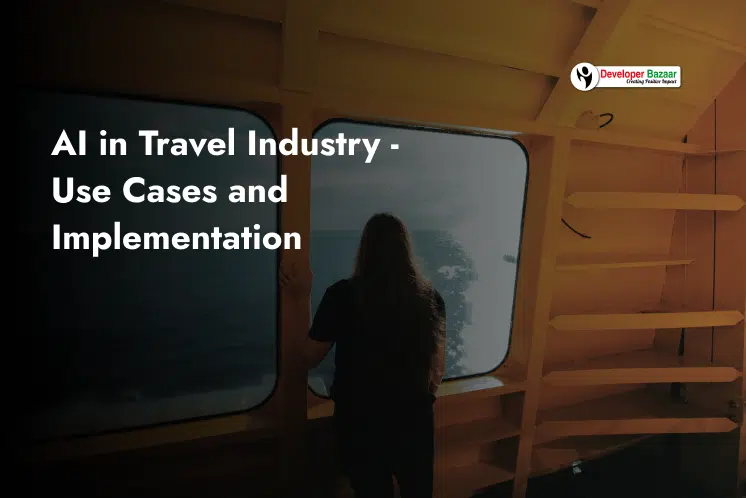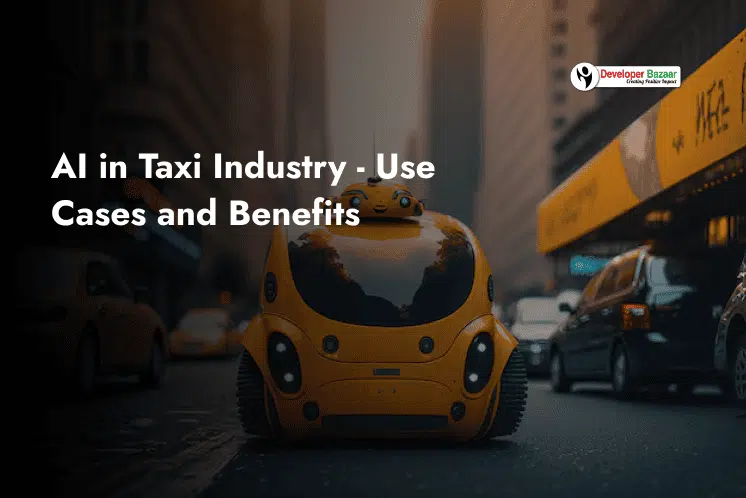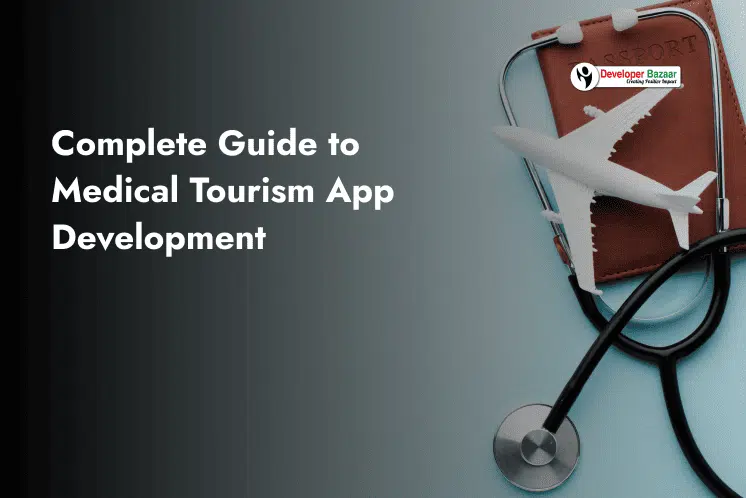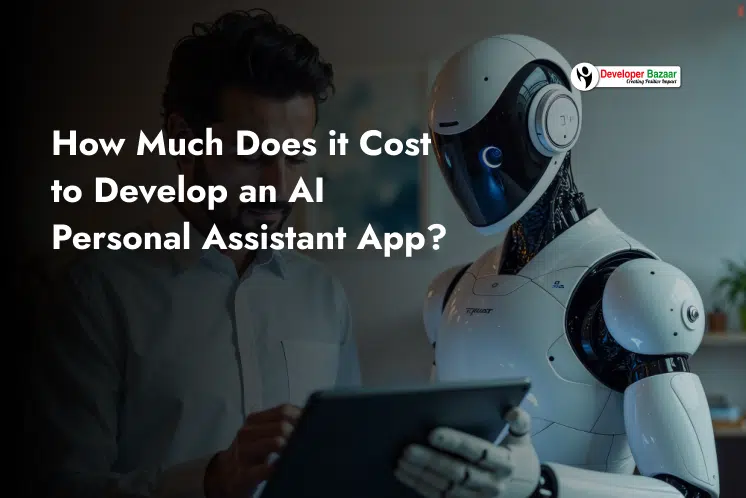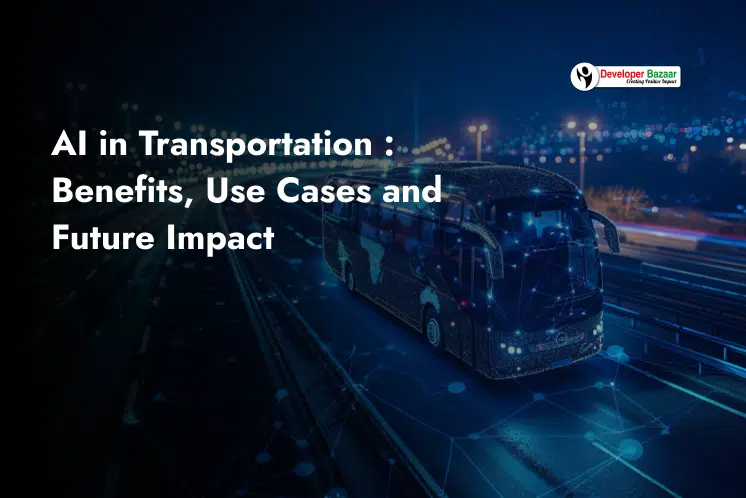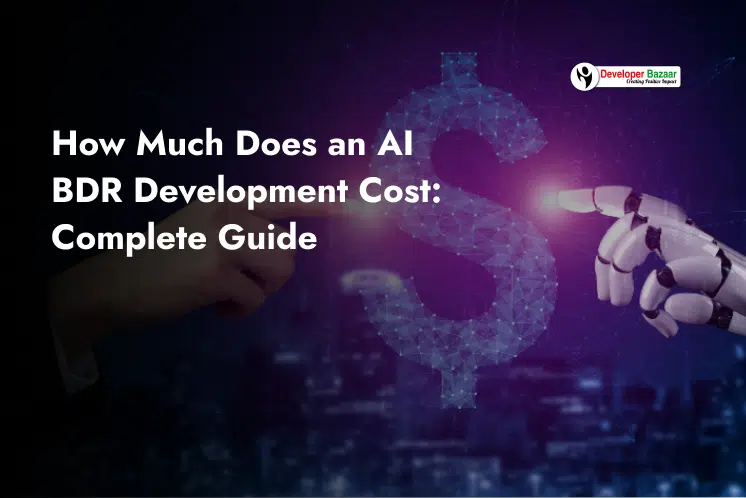Table of Contents
ToggleAI in travel is changing the way the tourism industry works. With the help of smart technologies, travel companies are now able to offer faster, safer, and more personalized services to customers.
From booking hotels to planning a trip, AI-powered solutions make everything easier and more efficient. This article explains how AI in the travel industry works, its real-life uses, and how it’s shaping the future of tourism.
How is AI in Travel Changing the Tourism Industry?
AI integration in the travel industry has transformed many parts of the travel experience. Airlines, travel apps, hotel websites, and even airport systems are now using AI technology to help travelers.
For example:
- Airports use facial recognition for faster check-ins.
- Travel apps suggest custom itineraries based on your likes.
- Chatbots answer your questions anytime.
This smart technology helps travel companies save time, reduce mistakes, and improve customer satisfaction. It’s no longer just a luxury, it’s becoming a must-have.
Market Overview of AI in Travel
The demand for AI app development in travel is growing very fast. Here’s what the numbers say:
- In 2022, the global AI in travel market was $81.3 billion.
- By 2027, it's expected to reach $423.7 billion, growing at a rate of 35% per year.
Reports also say that by 2026, the market value of AI services in the travel industry could reach $1.2 billion.
This shows that more and more travel businesses are investing in smart technology to stay ahead in the market.
The Potential of AI in the Travel Industry
The future of travel is smart, and AI in travel is leading the way.
AI can do many things such as:
- Personalize Experiences: Suggests places to visit, stay, and eat based on traveler behavior.
- Increase Efficiency: Automates booking, check-ins, and customer support.
- Improve Sustainability: Optimizes routes and energy use to lower carbon emissions.
- Boost Revenue: Uses smart pricing tools to increase bookings and profits.
Travel companies can also create new partnerships using AI-based machine learning algorithms. These partnerships help reach more people, offer better deals, and build smarter services.
Also, new job roles like AI experts, data analysts, and tech support staff are being created as businesses adopt expert AI solutions.
Cases of AI in Travel and Tourism
Artificial intelligence is changing how the travel and tourism industry works by offering many smart solutions.
Here’s how businesses use AI to make travel easier and better for customers.

1. Hotel Search and Booking
AI helps travelers find the best hotels by showing smart recommendations. It studies user behavior and shows hotels that match their needs and budget. With AI-powered solutions, the booking process becomes quick, clear, and hassle-free.
2. Itinerary Planning and Personal Recommendations
AI in travel creates personalized travel plans. It looks at your travel history, preferences, and even the weather to suggest perfect destinations and activities.
3. Predictive Analytics for Demand Forecasting
Travel businesses use AI-based machine learning algorithms to predict customer demand. This helps them prepare for busy times, manage resources better, and offer the right services at the right time.
4. Facial Recognition for Safety and Speed
Airports and hotels use facial recognition to speed up check-ins and increase safety. It also gives travelers a smooth and contactless experience.
5. Chatbots for 24/7 Customer Support
AI in travel industry includes smart chatbots that work round the clock. They answer questions, help with bookings, and share important travel updates instantly.
Real-World Examples of AI in the Travel Industry
Before integrating artificial Intelligence in your travel and tourism industry, check out how well-known travel companies are using AI technology to improve their services, increase efficiency, and deliver better experiences to their customers.
1. Expedia’s AI Chatbot – Personalized Support Made Easy
Expedia is a leading online travel company, and it’s using AI-powered solutions to make travel planning faster and smarter. One of its best features is the AI chatbot, which is available on platforms like Facebook Messenger and the Expedia app.
Here’s what the chatbot does:
- It helps users book flights, hotels, and car rentals with ease.
- It gives personalized suggestions based on user preferences and previous bookings.
- The bot is available 24/7 and answers common travel-related queries in real time.
- It reduces the need for human support agents by handling routine tasks such as itinerary updates, booking changes, and FAQs.
By using AI in travel, Expedia improves user satisfaction, shortens the booking process, and makes travel planning more enjoyable and stress-free.
2. Marriott International - Smart Pricing with AI
Marriott International, a global hotel chain, has adopted AI integration in the travel industry to stay competitive and improve revenue management.
how Marriott uses AI:
- The company applies AI-based machine learning algorithms to monitor market trends, competitor prices, seasonal patterns, and even local events.
- Based on this data, Marriott automatically adjusts its room rates to match demand in real time.
- The system ensures dynamic pricing, helping travelers get fair prices while maximizing profits for the business.
- Marriott also uses predictive analytics to estimate customer preferences and deliver customized offers.
This use of AI technology not only increases Marriott’s operational efficiency but also enhances the customer experience by offering better deals and more tailored travel packages.
Both of these brands Expedia and Marriott are great examples of how AI in the travel industry is helping companies provide smarter services, optimize operations, and grow faster in a highly competitive market.
Cost of Integrating AI in Travel Industry
Adding AI in travel industry involves various steps like design, development, and testing. Each step has its own cost, depending on the tools, features, and size of the project.
Key Cost Factors:
- Design Costs: To create simple UI/UX designs for tools like AI chatbots, the cost usually starts from $3,000 to $5,000.
- Development Costs: Building a basic working model (MVP) can cost around $8,000 to $10,000.
- Testing Costs: Quality assurance and testing for accuracy, bugs, and user performance may add $7,000 or more.
The total cost to build a basic AI-powered solution for travel can start from $30,000, but it may go higher depending on:
- The complexity of the AI features
- Location and experience of your AI services provider
- Type of solution (basic chatbot vs enterprise-level system)
If you want a more advanced solution like AI-based machine learning algorithms, voice assistants, or travel planners, the cost will increase accordingly.
Key Benefits of AI in Travel Industry
AI in the travel industry is helping companies create smarter, faster, and more enjoyable travel experiences for everyone.
There are various benefits:
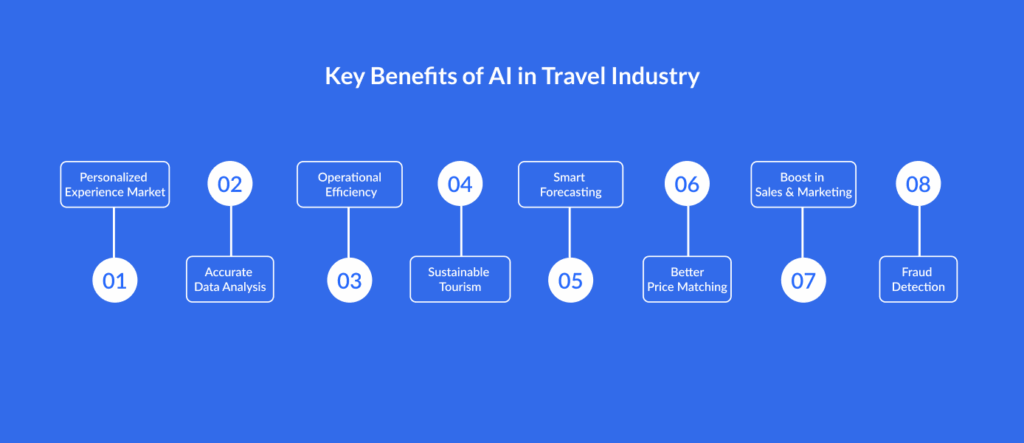
1. Personalized Experience
AI tools can study your past travel history, search behavior, and preferences to suggest places, hotels, and food that match your interests. This makes every trip feel special and personal. It also increases customer satisfaction and brings repeat business for travel companies.
2. Accurate Data Analysis
AI-powered solutions collect and study large amounts of data quickly, such as booking trends or seasonal travel patterns. Travel businesses use this information to understand customer needs and market demand. This helps in making better decisions, avoiding guesswork, and planning smart strategies.
3. Operational Efficiency
AI in travel reduces the need for repetitive manual work by automating tasks like ticket bookings, schedule updates, and answering the questions and answers. It saves time and reduces errors that can happen with human handling. This leads to faster services and more focus on complex customer needs.
4. Sustainable Tourism
AI integration in travel industry supports eco-friendly practices by helping plan the most fuel-efficient routes and reducing resource waste. It can also track energy and water use to cut down extra consumption. This not only protects the environment but also supports green tourism goals.
5. Smart Forecasting
AI-based machine learning algorithms can predict future travel trends using past booking data, weather, and market changes. This helps travel agencies manage inventory, staff, and pricing ahead of time. Accurate forecasting also reduces problems like overbooking or sudden resource shortages.
6. Better Price Matching
AI technology tracks market demand, competitor pricing, and user behavior to set the best possible price in real time. This dynamic pricing model ensures fair rates for travelers and better profit for businesses. It increases customer trust and helps boost bookings and sales.
7. Boost in Sales & Marketing
With AI app development, companies can show customized offers, ads, and travel packages to the right customers at the right time. AI tools help identify high-value customers and optimize marketing campaigns automatically. This improves customer engagement and gives higher return on marketing investment.
8. Fraud Detection
AI-powered systems keep travel platforms secure by monitoring user activity and spotting suspicious behavior instantly. It helps prevent problems like fake bookings, identity theft, or online payment fraud. This builds customer trust and ensures safe transactions for everyone.
Future Trends of AI in the Tourism Sector
The future of AI in travel is full of smart tools and innovative experiences. These upcoming trends are set to reshape how we plan, enjoy, and manage our trips:
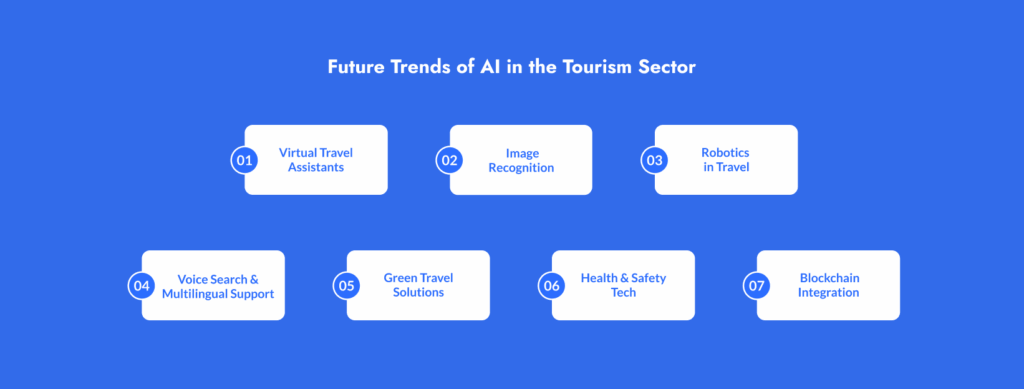
1. Virtual Travel Assistants
AI-powered chatbots and assistants will be available 24/7 to answer traveler queries, manage bookings, and give trip updates in real time. This helps travelers get instant support without waiting for human help.
2. Image Recognition
By just scanning a monument, landmark, or dish using your phone camera, AI will instantly provide information and suggestions. This creates interactive and informative travel experiences on the go.
3. Robotics in Travel
Robots will assist travelers at airports and hotels by handling luggage, giving directions, or offering room service. They make travel more convenient, contactless, and efficient.
4. Voice Search & Multilingual Support
Travelers will be able to search, book, or ask for help using voice commands in their native language. This removes language barriers and offers a smoother user experience.
5. Green Travel Solutions
AI helps reduce pollution by planning fuel-efficient routes and managing energy and waste at hotels and airports. It supports sustainable and eco-friendly travel practices.
6. Health & Safety Tech
AI tools will monitor health data, air quality, and crowd levels to ensure safer travel during health crises or peak times. This adds an extra layer of safety for both travelers and providers.
7. Blockchain Integration
Blockchain combined with AI ensures secure, tamper-proof bookings and payments. It builds trust by making all transactions transparent and traceable.
Companies that adopt these AI-powered solutions early will gain a competitive edge and provide unforgettable travel experiences.
Fueling Travel Excellence with Developer Bazaar Technologies
To sum it up, integrating AI in the travel industry brings a wide range of benefits from personalized travel recommendations to fraud prevention and seamless customer support. AI tools like multilingual chatbots, weather and traffic prediction, and virtual travel assistants greatly enhance the overall travel experience.
Developer Bazaar Technologies is your trusted technology partner for building powerful AI-driven travel solutions. With a skilled team and years of experience, we specialize in delivering AI development services and AI-powered solutions that match your unique business needs.
We work closely with you at every step from idea to launch to make sure the AI integration fits smoothly into your current system. Whether it’s automating bookings, enabling dynamic pricing, or creating smart travel assistants, our expert AI solutions are built to increase your efficiency and drive real growth.
Partner with Developer Bazaar Technologies to unlock the full potential of AI technology in travel and give your customers a smarter, safer, and more satisfying journey.
FAQs
Q1. What is the cost to build an AI travel app?
A: A basic AI travel app development cost around $30,000. However, costs can increase depending on features, company size, and location.
Q2. How can AI help improve customer service in travel?
A: AI tools like chatbots provide 24/7 support, answer questions quickly, and help with bookings offering a better travel experience.
Q3. Is AI safe to use in the travel industry?
A: Yes, with built-in fraud detection and secure data handling, AI-powered solutions protect users and companies alike.
Q4. What are examples of AI in tourism?
A: AI travel assistants, virtual hotel tours, dynamic pricing systems, and smart recommendation engines are common examples.
Q5. Why should travel companies invest in AI?
A: AI increases efficiency, boosts sales, reduces costs, and creates happier customers all of which help businesses grow faster.

RM Mishra
Co-Founder
Developer Bazaar technologies
